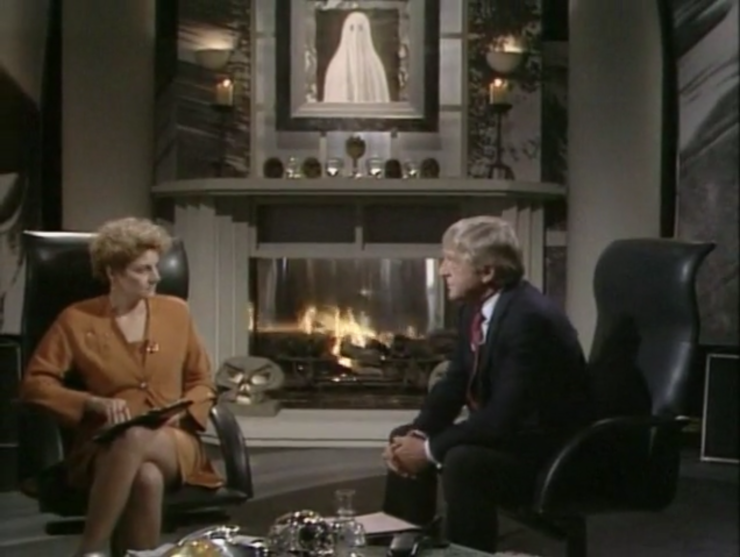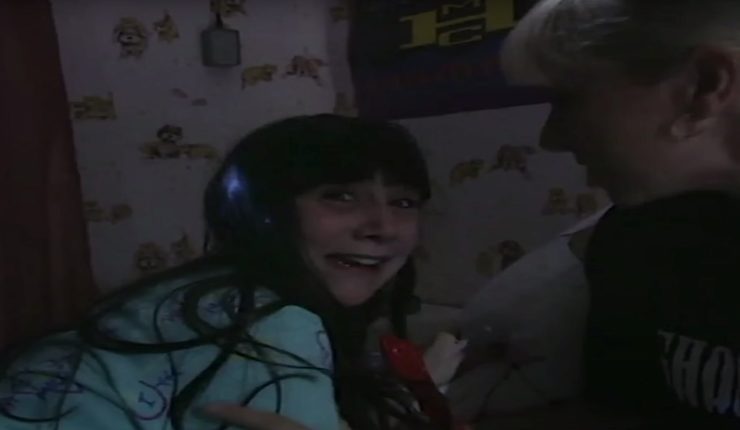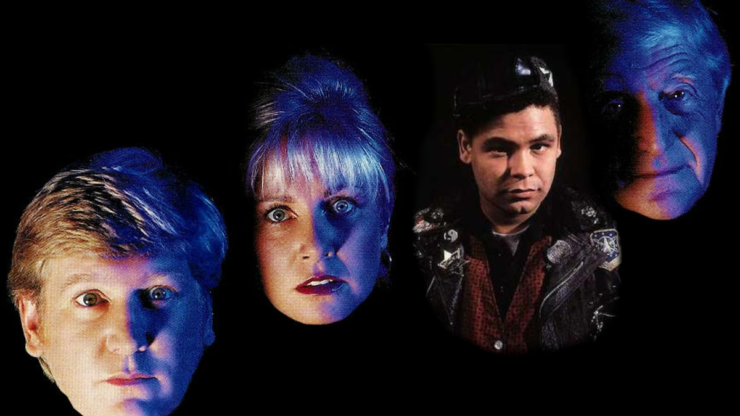On Halloween night 1992, more than 11 million people tuned into Ghostwatch on BBC 1. Panic, controversy, and outrage followed. The infamous horror classic has never been re-aired on UK television since.
Written by Stephen Volk and directed by Lesley Mann, Ghostwatch is a mockumentary masterpiece and still one of the scariest horror movies ever made. Masquerading as a live 90-minute news broadcast, the film centers on a house in London where a single-mother and her two daughters claim they’ve been plagued by a poltergeist. As fact and fiction blur, the broadcast becomes far darker and more sinister than the unwitting TV hosts could imagine.
Ghostwatch remains a personal favorite, though I was late to the party, catching it in the late 2000s on Google Video (the internet’s VHS). I imagine what it must have felt like to watch it in 1992 and to be haunted by it in the days after, that stain of pure dread that neither daylight nor nightlight can wash away. The film is coming back to Blu-ray in December yet isn’t streaming anywhere stateside for its anniversary. (Maybe it will make a return to Shudder?) For now, you can catch it on the Internet Archive for an appropriately creepy lo-fi vibe.
There’s so much admirable craft in this film that mixes fiction and non-fiction. I’ll avoid spoilers in this appreciation for the 30-year-old classic. If you’re unfamiliar with Ghostwatch, please just experience it for the first time—you folks are in for a treat.
“It was actually, theoretically, a brilliant piece of television.”
Writer Stephen Volk originally conceived of Ghostwatch as a five-episode television miniseries. It was suggested that the whole thing should instead be condensed into a single episode, with Volk deciding it could be done like he’d envisioned the finale: a faked live broadcast. (Some sources say Ghostwatch was supposed to be six episodes, but Volk’s series outline from 1988 is for five. “I have always told people six! Apologies!” Volk wrote in 2020.)
The film stars many British television personalities playing themselves, including talk show host Michael Parkinson, children’s TV staple Sarah Greene, broadcaster Mike Smith, and Red Dwarf’s Craig Charles. If you didn’t catch the voiceovers in the intro and end credits that say it’s a work of fiction, you might have assumed you were watching terrorized celebrities at the epicenter of a live supernatural catastrophe. You know, as you do.
During the Ghostwatch broadcast, a phone number would appear on the screen periodically. Viewers were encouraged to call in and share their own paranormal encounters. If you were able to get through, you’d be informed that Ghostwatch was a work of fiction and that everything was okay. If.
The problem: the handful of people working the phones were flooded with 20,000-30,000 calls. Most of the distressed callers got busy signals.
No wonder the moralizing backlash that followed. You can witness some of that anger in this Bite Back clip. And yet even an upset member of the audience conceded that despite his misgivings, Ghostwatch was, theoretically, a brilliant piece of television.

“Whatever’s in there, it’s deliberately muddying the waters.”
Ghostwatch creates such a remarkable sense of verisimilitude, and it’s not just the stunt casting. Volk drew inspiration from the Enfield poltergeist, while Manning tried to make the film feel like television of its day. There’s crosstalk and interruptions during the simulated live broadcast to sell the illusion of an unscripted night unfolding in real time. The footage was actually shot and edited long before.
Part of the reason Ghostwatch feels real—or at least real enough—is how slow it is in the beginning. For the first 30 minutes, not much happens. Sure, there might be some general unease, but it’s quite cheesy, albeit authentically cheesy. Charles yucks it up on location with far too many corny jokes. Parkinson is so cheery in the studio, ditto Dr. Lin Pascoe (Gillian Bevan), the fictional psychologist who’s witnessed some of the happenings at the house and can offer insight into what the literature has to say about these sorts of things. Greene bobs for apples with the kids, Smith juggles real stories of the supernatural while taking your fake live phone calls.
Notice the cheeky man-in-a-sheet ghost portrait above the fake mantlepiece early in the film. That detail helps set the initial disarmed tone. But notice how, as the proceedings become more serious, we rarely see that silly portrait. The fake ghost disappears as we are propelled further into this real ghostly event.
Your mileage may vary when it comes to how real the film feels. Even after it aired, some viewers complained how hammy it seemed (but were scared nonetheless). I wonder what younger audiences might think of it now. Ghostwatch plays with an antiquated form of TV media (the live talk show with shocking revelations), and it’s done at a deliberate pace with media personalities who are generations removed from the zeitgeist.
Are some frights timeless and others not? Did you really just have to be there? Is there a sell-by on some horror?
“Many of you, I’m sure, will have seen pictures of the vast spaghetti plantations in the Po Valley.”
Ghostwatch isn’t the first media prank on reality. Manning has also cited Orson Welles’ War of the Worlds radio broadcast in 1938 as an inspiration, another great bit of fictive legerdemain. On April Fool’s Day 1957, the investigative documentary program Panorama aired a short piece on a spaghetti-tree harvest in Switzerland. The BBC reportedly received calls from viewers asking for tips on how to cultivate their own pasta plants. And from fairgrounds to World of Sport to the WWE, what is wrestling as an artform but a physical manifestation of the hyperreal?
Peter Jackson and Costa Botes would perpetrate a hoax on the New Zealand public in 1995 with Forgotten Silver. This excellent television mockumentary chronicled the life of Colin McKenzie, an unsung Kiwi cinema pioneer whose name was lost to time and whose achievements were attributed to others. In supplemental material on the Forgotten Silver DVD, Jackson shared an anecdote about a film professor claiming they’d in fact heard of McKenzie before. Some insecure people lie about knowing certain facts, but it takes a special kind of insecure person to lie about knowing certain lies.
Like the War of the Worlds and the spaghetti-tree harvests, there’s a willingness for some members of the public to believe what was heard or seen simply because it was on the air. Without question, this report has to be true. These images, packaged thusly, don’t lie. Should we be so skeptical? We saw it, didn’t we? Ceci n’est pas un alien invasion.
There might be a little bit of implied FOMO for some of these compelling fakeries. You’re cultured and educated, so I am sure you’ve seen spaghetti plantations before in your international travels. Imagine how mortifying it would be—what a blow to your status—to admit you have no idea what that person is talking about.

“…I don’t know.”
On first watch, Ghostwatch terrified me because I had no idea what I was getting into. I was engrossed in all the narrative implications and askance glimpses of the evil presence of the story. On subsequent rewatches, I’m still shaken by film. What still rattles most is the sense of helplessness that takes hold. Like so many great horror stories, we watch people stray a little too far into the unknown, not realizing the danger they’ve entered into until it’s too late.
More than that, by mimicking the form of a live broadcast, Ghostwatch feels like I’m watching a disaster happening on the news. The only thing our TV presenters can do is report what they’re seeing, and the only thing I can do is watch. Something has happened and already we are too late to stop it. This is a force of nature. Nothing can be done.
Even Dr. Pascoe, a supposed expert in these sorts of things, is uncertain about what she’s seeing and why it’s happening. Multiple times as new information comes to light, Parkinson asks Dr. Pascoe for clarity, as if control can be regained if we just knew what was going on. The only thing Dr. Pascoe can say is, “I don’t know.”
That’s the real terror in Ghostwatch even if you don’t believe in ghosts. I imagine a stream or broadcast of something terrible happening in real life. I imagine an expert consulted about what we can do to save ourselves. I imagine that expert’s terrified uncertainty about what is going on and what to do next.
But there is a certainty at the heart of an “I don’t know” in this context that is most terrifying to me. In this situation—which will hopefully remain just a fiction in my head—a worried “I don’t know” is a form of denial of a more fundamental fear of death. Better to assert ignorance at that moment than admit that we are doomed.
And if that expert knows they’re a goner, it’s only a matter of time for the rest of us.
Hubert Vigilla is a Brooklyn-based writer whose fiction has appeared in The Normal School, No Tokens, Territory, and elsewhere. You can follow him on Twitter.











I remember Ghostwatch vividly. I recorded it for some reason and watched it the next day and even then its scared me silly! I was able to freeze the tape (yes it was a VHS tape) and go back and see the special effects. Even with that and watching it during the day it was scary.
A truly wonderful and unforgettable piece of TV.
I remember vividly watching this as a boy just about to enter his teens and it was very scary. I don’t know if I knew it was a drama or if we missed the start, I’m pretty sure I did know but at the same time, you can forget and I think I did for a while because it was so on note with broadcasts at that time.